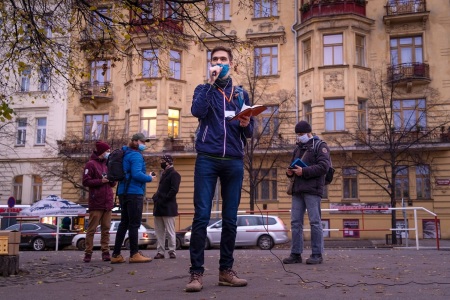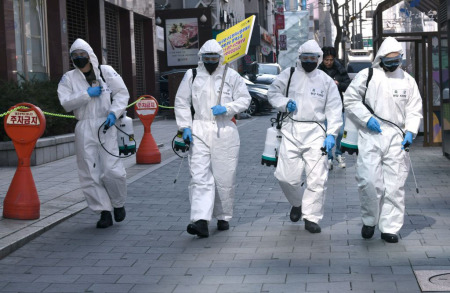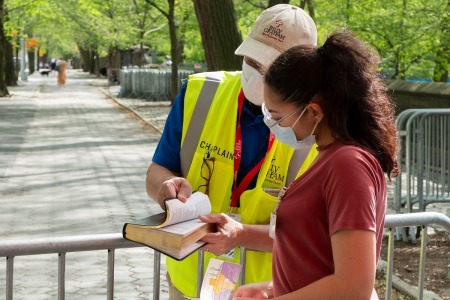Missionary work in coronavirus age: Major disruptions but many still going strong

Earlier this year, when shutdowns over the coronavirus were fairly recent, experts on mission work came together for a podcast to discuss the possible impact of COVID-19 on their efforts.
Hosted by ABWE International in late April, the Missions Podcast episode examined how mission work was going to be impacted, possibly for the long term, by the pandemic.
Experts on the podcast expressed varied concerns over issues like the future of short-term missions and how well funding for organizations will be sustained.
Several months later, representatives of multiple missionary organizations and one megachurch that oversees many missions abroad, have experiences to report about how the pandemic is affecting them.
The Christian Post talked with multiple missions groups about issues including how they are weathering the pandemic and the future possibilities for mission work abroad.
‘God has blessed us tremendously’

Despite a time known for economic downturn and financial uncertainty, multiple mission groups reported having financial stability and even seeing some increases in giving.
ABWE International, a missionary group previously known as the Association of Baptists for World Evangelism, has seen a surprisingly high amount of support during the pandemic.
Alex Kocman, director of advancement and communications at ABWE International who was part of the April podcast, told CP that “this year is set to be one of ABWE’s strongest financial years to date.”
“Once again, we are elated by God’s faithfulness,” said Kocman. “Some missionaries saw a decrease in monthly support, but this has not resulted in personnel being pulled from the field.”
“Simultaneously, those raising support have found it easier to build their support teams through Zoom meetings with church leaders, friends, and other supporters.”
Kocman noted that while short-term mission trips were “at a standstill,” long-term missionaries “have continued to deploy to the field this year.”
“Our overall sense is that God has blessed us tremendously, in spite of global events which one would think would immediately bring missions to a screeching halt,” he continued.
Kocman referenced the ABWE’s Live Global ministry, an entity launched before the pandemic shutdowns that is centered on using technology to connect Christians in remote locations.
“Live Global was uniquely poised for ministry in a pandemic,” he explained. “We are stunned at the providence of God.”
Brian Albrecht, president of MissionGO, a missions group founded in 1943 and with outreach efforts in more than 55 countries, told CP that their finances were stable despite a drop in giving.
“For the general fund, which is the administrative budget that keeps the thing going, those donations have dropped, but so far we’ve been very happy, we’ve been thankful, we’ve been praying and God has blessed us and used us,” said Albrecht.
Albrecht noted that MissionGO had “reserves” for their finances so they had “no issue” with possibly “going out of business” due to recent declines in giving.
For the time being, according to Albrecht, his organization has been able to pay for things without tapping the reserves, aided in part by the paycheck protection program from the government.
“Raising support right now is a difficult thing,” he acknowledged, “because, if people are concerned about their personal income and whether the family is going to be safe, it’s going to be harder for them to be generous to help missionaries and nonprofit causes.”
Training Leaders International President Darren Carlson, whose organization was founded in 2009 and seeks to give theological training to churches across the world, reported a drop in giving.
Carlson, who was one of the experts on the April podcast, told CP that this decline in support was “due to no short-term trips to raise money for,” adding that this also meant that expenses had decreased.
“But overall, giving is still down,” he stressed. “Based on talking to other organizations like ours, I would say giving is down 30%. Some organizations have taken PPP funds to offset this.”
Radius International President Brooks Buser, who was previously part of the April podcast, told CP that his organization has “done pretty good,” but believed that this stability may in part be due to them not being a “sending agency.”
“Radius is a little bit different,” Buser explained. “We’re a training school and our specific goal is to train people to get to some of the hardest to reach language groups.”
“So a lot of our support hasn’t been affected by the people that are looking to get involved and that are going to be with us through thick and thin.”
The International Mission Board of the Southern Baptist Convention, which was founded in 1845 and is based in Richmond, Virginia, saw strong giving online this year.
According to IMB spokesperson Julie McGowan, during June 1-Oct. 31, 2019, they saw an increase in digital giving of 47% while in the same time frame this year, they had an additional increase in digital giving of 42%.
“The IMB is fueled by a legacy of generous supporters captivated by a seemingly impossible vision for all to know Christ,” said IMB Chief Advancement Officer Chris Kennedy in a statement emailed to CP.
“Throughout our 175-year history, these sacrificial givers have looked beyond present hardship with hope and continued or even expanded their faithful giving in the toughest times. We fully believe they will maintain this generosity in our present circumstances.”
A ‘whole other world’ for missions

As with so many other aspects of life, overseas missions were deeply impacted by the coronavirus pandemic and the subsequent lockdowns and restrictions on social gatherings.
IMB spokesperson Julie McGowan recounted to CP how much uncertainty they had when the disease was first reported in East Asia in 2019.
“The early stages in East Asia were extremely challenging because the situation came quickly, and we had no information about what would lie ahead,” explained McGowan.
“Many on the mission field were facing insecurity of how their ministries would be impacted throughout the spring. Following the experience we gained in East Asia, personnel in Europe jumped into the next full-blown crisis, which we’ve seen spread around the world.”
IMB was not exempted from the coronavirus, as multiple COVID-19 cases were reported among their personnel across the planet, with the vast majority being mild in symptoms.
“Our people have felt the trauma differently, depending on the ways the particular population around them has been impacted,” she said. “In every place where our personnel have been located, they are thanking the Lord for resources they have in hand to respond to the crisis, whether in their own homes, or extra resources they’ve been able to use to help others and to meet needs.”
Mission groups reported having to cut short some trips and bring people back to the United States due to the public health concerns arising from the pandemic.
Albrecht of MissionGO said the pandemic “has changed missions a lot over this last year” and “caused several disruptions here, there, and everywhere.”
“We’ve had to rescue several missionaries,” said Albrecht. “The American embassies were very helpful to us, we were eventually able to get them home. One person was really sick and had to get back and get decent medical treatment out of Africa.”
Albrecht also talked about a Middle Eastern missionary who was in the United States when the pandemic began and had to go back to Amman, Jordan to be with his family.
According to Albrecht, they worked with an embassy to get him back home, where he had to quarantine for 14 days at a five-star hotel in Amman which he had to pay for himself.
“We have missionaries in all these different places and it turns out to be that different governments have different rules and regulations, but the outcome is that people can’t move around,” he explained.
“In African countries, the internal air travel is shut down. You can’t get from place to place, you have to drive through the jungle. We have less people doing that. And so there’s lots of disruption and lots of problems that way.”
Albrecht recalled how a recent mission trip to the Democratic Republic of the Congo, whose infection rate remains fairly small, involved multiple tests for the participants, as well as a two-day sequester.
“They’re testing everybody that comes into the country and you have to quarantine,” he said, noting that the mission team got a “special dispensation” from the usual quarantine rules.
“We had the people tested twice before they got on the plane, then they got tested when they landed, and they had to sequester for two days and then because they had to drive up through the jungle, which was another three-day trip, they decided that was good enough that when they got to their destination, if they tested without the disease that they would be allowed to do their work.”
Melissa Vandermey, director of communications with MissionGO, described some of the challenges for mission work on the home front, namely the recruitment process.
Before the pandemic, according to Vandermey, a missionary candidate would normally go “full time fundraising and doing face-to-face meetings at coffee shops at restaurants, etc.”
“And now they’re having to do fundraising all over Zoom. So it’s a whole new world that our missionaries are having to face,” she noted.
Vandermey recently spoke with missionaries based in France and how they were going to come back to the United States in a few weeks for home assignments that involve fundraising.
“They said ‘it will be very interesting once we get home because it will be: how do we network with people via Zoom, etc.?’” she added. “It’s just a whole other world.”
A ‘standstill’ for short-term missions

A major theme reported by multiple groups was the drop in short-term missions, such as those that last only a couple of weeks and often involve philanthropic efforts like medical aid.
Albrecht of MissionGO explained that his organization canceled all of their short-term mission trips that had been planned for the middle and end of the year, with the hope that they can be rescheduled for 2021.
“Some trips can be refocused and reprogrammed with flights and things,” added Albrecht, cautioning that many who signed up for a trip this year will have scheduling problems next year.
For example, Albrecht cited many short-term missions involve recent college graduates or students who were planning to go on a mission trip during a summer vacation.
“That summer you were going to put that aside to go and do that activity, but now you’re a year later down the road and hopefully, you’ve found a job and you’re getting more settled,” he said. “Most places where you find a new job you can’t get a lot of vacation, so therefore you can’t get the time off to go.”
MissionGO plans to, whenever possible, “repurpose” a short-term mission trip for people that were planning to go abroad this year and will still be willing and able to go next year.
“There will probably new people or different people or a mixture of the two that will be going this year,” he said. “We have a lot of people that are maybes, but the problem is there’s so much uncertainty now, you don’t know what next year is going to bring.”
The longer term “reverberations” on missions, especially regarding the drop in short-term missions, is still to be seen, Buser of Radius believes, “because long-term missions is affected by short-term missions.”
“People get challenged and commissioned through short-term trips and those have almost entirely stopped for the last six months,” explained Buser. “So the ripple effects are going to be down the road, two to five years.”
While short-term missions saw “a standstill earlier this year” due to a United States government advisory against global travel, Kocman of ABWE International said they have “been able to move more personnel” since the advisory was lifted in August.
Thus far this year, ABWE International had 176 short-term workers mobilized and had what Kocma described as a “record-breaking” 71 mid- and long-term missionaries appointed.
“In an ordinary year, the number of short-termers would be far greater,” he acknowledged. “We have proactively launched an effort to open a new center for short-term missions being developed by Jason Phillips, our most newly appointed executive director.
“We are excited at the opportunity to breathe life into our short-term mobilization efforts.”
‘A ray of hope in the midst of a challenging year’

Immanuel Bible Church, a nondenominational megachurch based in Springfield, Virginia, was a church that had an extensive missions outreach that shut down during the pandemic.
According to Michael Connor, pastor of Mission and Outreach at Immanuel, his church had 27 international-based missions and normally did about a dozen short-term trips on an annual basis.
“We canceled all the short-term trips for 2020. There’s not one that happened,” explained Connor to CP, saying the pandemic hit Immanuel “pretty severely.”
“And we also had a number of our international workers who either needed to get out of the country they were in because of COVID lockdowns or have not been able to return there.”
Connor nevertheless expressed some optimism about the future of missions, explaining that one long-term impact was “enhanced methods of remote communication.”
“I think that’s going to be a gain not just for missions, but for church life in general,” he commented. “Remote meetings, Zoom face-to-face things, Skype — I think there will be more virtual contacts moving forward.”
Recently, announcements have been made by multiple major pharmaceutical companies that they have developed highly effective COVID-19 vaccines which will begin distribution soon.
As the vaccinations are set to begin in December and ramp up in the new year, many mission groups have been looking to how the pandemic will influence how overseas missions are done.
Buser of Radius is hopeful that the distribution of new vaccines being approved for use against COVID-19 could allow for more opportunities for mission work.
He noted that since the vaccines developed by Moderna and Pfizer require low temperature storage, it is “going to be hard to get into really closed access third world country rural locations.”
“I think there’s going to be a growing need for Christians, from people that care about those parts of the world to be involved. So I think it’s going to result in, Lord-willing, some opening of some doors,” Buser said.
Carlson felt that the efforts to curb the spread of the coronavirus by some governments might be used to make it harder for missionaries to operate abroad, citing “contact tracing” as an example.
“I think one really, really bad result of contact tracing is that governments are now tracking foreigners more closely, and scrutinizing itineraries and contacts,” said Carlson. “There are ‘closed’ countries that will be very challenging to go to moving forward.
“And even if Americans get vaccinated, will you be able to gather people in another country legally?”
IMB, meanwhile, is “developing plans and thoughts about how to move forward” with international missions as the COVID-19 vaccine is widely taken, McGowan said.
“We believe that God will bless our work in new ways post-pandemic, as we see new efforts that have been thoroughly undergirded in prayer, and as we engage with new partners to partner alongside in the days ahead,” she stated.
“We also expect there will be a gratitude for freedom to operate in a more normal fashion that will make post-pandemic work even more satisfying than pre-pandemic work, when we were able to do whatever we decided with few obstacles.”
She also saw great potential in the usage of online venues for mission work, noting that “Southern Baptist workers are spending more time praying personally and with others via the internet.”
“People are coming to the Lord through new avenues such as social media in greater numbers than prior to the pandemic,” she highlighted.
“This is a ray of hope in the midst of a challenging year.”





















